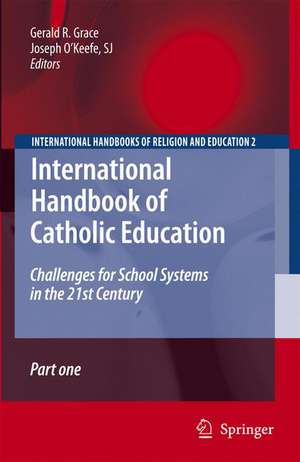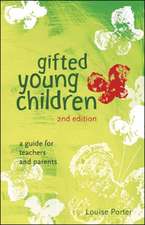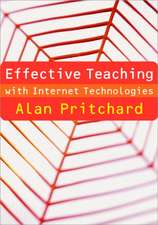International Handbook of Catholic Education: Challenges for School Systems in the 21st Century: International Handbooks of Religion and Education, cartea 2
Editat de Gerald Grace, Joseph, SJ O'Keefeen Limba Engleză Hardback – 12 oct 2007
The unifying theme of the Handbook will be ‘Catholic Education: challenges and responses’ in a number of international settings. The analytical focus will be problem orientated in examining church-state relations, the consequences of globalisation, the impact of secularisation, the extent of Vatican II transformations of educational policy and practice, issues of school leadership and governance and other contemporary challenges. At the same time an examination will be undertaken of the various responses which are being made to these challenges. The two volumes will be organized by geography.
| Toate formatele și edițiile | Preț | Express |
|---|---|---|
| Paperback (1) | 1589.97 lei 38-44 zile | |
| SPRINGER NETHERLANDS – 23 aug 2016 | 1589.97 lei 38-44 zile | |
| Hardback (1) | 1625.56 lei 38-44 zile | |
| SPRINGER NETHERLANDS – 12 oct 2007 | 1625.56 lei 38-44 zile |
Preț: 1625.56 lei
Preț vechi: 2138.89 lei
-24% Nou
Puncte Express: 2438
Preț estimativ în valută:
311.09€ • 321.37$ • 258.91£
311.09€ • 321.37$ • 258.91£
Carte tipărită la comandă
Livrare economică 21-27 martie
Preluare comenzi: 021 569.72.76
Specificații
ISBN-13: 9781402048043
ISBN-10: 1402048041
Pagini: 948
Ilustrații: XIX, 906 p.
Dimensiuni: 155 x 235 x 50 mm
Greutate: 1.86 kg
Ediția:2007
Editura: SPRINGER NETHERLANDS
Colecția Springer
Seria International Handbooks of Religion and Education
Locul publicării:Dordrecht, Netherlands
ISBN-10: 1402048041
Pagini: 948
Ilustrații: XIX, 906 p.
Dimensiuni: 155 x 235 x 50 mm
Greutate: 1.86 kg
Ediția:2007
Editura: SPRINGER NETHERLANDS
Colecția Springer
Seria International Handbooks of Religion and Education
Locul publicării:Dordrecht, Netherlands
Public țintă
ResearchCuprins
The Americas And Europe.- Catholic Schools Facing the Challenges of the 21St Century: an Overview.- No Margin, No Mission: Challenges for Catholic Urban Schools in the USA.- Challenges to Faith Formation in Contemporary Catholic Schooling in the Usa: Problem and Response.- Developments in Catholic Schools in the USA: Politics, Policy, and Prophesy.- Contemporary Challenges to the Recruitment, Formation, and Retention of Catholic School Leadership in the USA.- Beyond Religious Congregations: Responding To New Challenges In Catholic Education.- Challenges for Catholic Schools in Canada*.- Secularization: Challenges for Catholic Schools in Uruguay.- A Theological-Pedagogical Turning Point in Latin America: A New Way of Being School in Brazil.- Catholic Schools in Peru: Elites, the Poor, and the Challenge Of Neoliberalism.- The Catholic School in the Context of Inequality: the Case of Chile.- Catholic Education, State and Civil Society in Argentina.- Catholic Education at the Crossroads: Issues Facing Catholic Schools in Northern Ireland.- Catholic Schools in England and Wales: New Challenges.- Celebrating the Past: Claiming the Future.- The Education Battle: The Role of the Catholic Church in the Spanish Education System.- Contemporary Political Relations of Catholic Education: Challenges for Catholic Schools in Portugal.- Ccatholic Schooling in France: Understanding “La Guerre Scolaire”.- Theologizing With Children a New Paradigm for Catholic Religious Education in Belgium.- Towards a SubParticipative Identity: Catholic Education in the Netherlands in Search of a New Approach.- Secularisation and Catholic Education in Scotland.- Catholic Schooling and the Changing Role of Women: Perspectives from Malta.- The Catholic School System in Italy: Challenges, Responses, andResearch.- Challenges Facing Catholic Schools: A View from Rome.- Contemporary Challenges for Catholic Schools in Germany.- Challenges for Catholic Education in Poland.- Religious Congregations at Work in Education—With Special Reference to Belgium.- Africa, The Middle East, Asia, And Australasia.- Catholic Church and State Relations in Zambian Education: A Contemporary Analysis.- A Beacon of Hope: Catholic Schooling in South Africa (and Lesotho).- Catholic Schooling: Responses of Malawian Students.- The Challenge of Curriculum in Kenya’s Primary and Secondary Education: The Response of the Catholic Church.- Catholic Education in Ethiopia: Challenges and Prospects.- Catholic Education and the Church’s Concern for the Marginalized: A View From India.- Contemporary Challenges to Faith Formation in Indian Catholic Schooling.- Catholic Education in India: Challenge, Response, and Research.- Schooling and Catechesis in the Holy Land: Challenges and Responses.- Catholic Schools in the Philippines: Beacons of Hope in Asia.- Ethics, Moral, and Social Responsibility Formation of Students: Contemporary Challenges for Catholic Schools in Thailand.- Challenges for the Schools of the Sisters of Saint Paul of Chartres in Thailand: A Case Study Account.- Challenges for Catholic Schooling in Hong Kong.- Catholic Schools in Japan: Context and Contemporary Challenges.- Challenges for Catholic Education in Australia.- Australian Catholic Schools in a Changing Political and Religious Landscape.- Religion and Culture: Catholic Schools in Australia.- Catholic Schools in New Zealand.
Recenzii
Review in British Journal of Educational Studies (BJES), September 2009
International Handbook of Catholic Education: Challenges for School Systems in the 21st Century in 2 Volumes by Gerald R. Grace and Joseph O’Keefe, S.J., (editors) published by Springer: Grand Rapids. ISBN 978-1-4020-4804-3 (HB) 906 pages
Gerald Grace and Joseph O’Keefe have produced a two volume work that has seriously confirmed the place of the study of Catholic education as a distinctive academic and policy-related field. These two volumes, organised by geography, took five years to compile and represent the first international survey of the challenges facing Catholic school systems in over 30 societies across the world. Each chapter is written by experts, academic and practitioners, international scholars, researchers, school leaders and teachers. There are 45 chapters covering every continent each describing the challenges being faced by Catholic school systems in the 21st century in that country. Each chapter is a systematic study of the challenges encountered and the editors have been careful to insist on a section on what the research agenda should be from each of their contributors. This provides an impetus for further research and Professor Grace has since launched the journal entitled International Studies in Catholic Education, first published by Routledge in March 2009. This journal continues the aims of the two volume text in providing even more research evidence on Catholic education across the world.
Professor Gerald Grace, is the Director of the Centre for Research and Development in Catholic Education in the Institute of Education, University of London. A Centre he founded and which has made the most, perhaps the only, important contribution to the study of Catholic education in the UK. His leadership and vision have provided educationalists, and the Catholic Church, with a new university-basedCentre, a new and prestigious academic international journal and these two volumes which clearly place the academic study and research of Catholic education on an international footing. It is an extremely impressive story and one that ought to be more widely recognised and celebrated. Grace also published his own ground breaking research in 2002 as Catholic Schools: Mission, Market and Morality (Routledge).
The editors outline in the introductory chapter to the Handbook an excellent summary of the ten major challenges facing Catholic schools. These challenges are found in the 45 chapters in the Handbook and are, because of their importance, worth mentioning here in brief:
In Section 1 (USA and Canada) of the Handbook the chapter on ‘Developments in catholic Schools in the USA: Politics, Policy and Prophesy’ by Gerald Cattaro and Bruce Cooper neatly summarises the major issues facing Catholic schools in the USA over the last decade. It provides detailed statistics and very good analysis and explanation of important trends. In Section 2 (Latin America) the chapter by Jeffrey Klaiber on ‘Catholic Schools in Peru: Elites, The Poor, and the Challenge of Neoliberalism’ is well written and a short introduction to an important issue in the context of Latin America. Section 4 deals with Africa and there is an excellent chapter by Mark Potterton and Nathan Johnston entitled ‘A Beacon of Hope: Catholic Schooling in South Africa’. Both these authors have long experience of the situation in South Africa and this chapter demonstrates a clear grasp of the issues. Section 5 looks at India and the Middle East with three chapters devoted to India and one to schooling in the Holy Land. Section 6 looks to the Philippines and Thailand whilst Section 7 examines Hong Kong and Japan. The chapter by Magdalena Mo Ching Mok is particularly worth reading and is simply entitled ‘Challenges for catholic Schooling in Hong Kong’. The final Section 8 considers Australia and New Zealand. The first two chapters on Australia by Susan Pascoe and Brian Coke contain a wealth of information and explanation on the challenges being faced within this particular political and religious landscape. There are of course many more chapters in each section – far too many to mention in this brief review.
Each of the chapters naturallyvary in length and style, but each surveys the challenges within particular territories and each gives some thought to a research agenda for the future. This Handbook is a must for any doctoral students in Catholic education and will no doubt inspire and practically assist them in choosing areas for research. The combined references alone make this Handbook an essential reference work. The chapters that address the political contexts and Church-State relations in various countries are particularly enlightening and show common patterns of issues. The editors are right to see these chapters as raising strategic research areas for the future. There are only two critical comments I would make of this Handbook. First, many priests and religious have contributed to this Handbook making it slightly clerical in feel and there is a tendency for the chapters to be written from a liberal Catholic perspective. Second, the chapters that deal with secularisation issues are limited in theoretical scope. However, the Handbook overall is an astonishing achievement and I congratulate the editors and recommend it strongly.
Professor James Arthur Co-Editor : BJES
International Handbook of Catholic Education: Challenges for School Systems in the 21st Century in 2 Volumes by Gerald R. Grace and Joseph O’Keefe, S.J., (editors) published by Springer: Grand Rapids. ISBN 978-1-4020-4804-3 (HB) 906 pages
Gerald Grace and Joseph O’Keefe have produced a two volume work that has seriously confirmed the place of the study of Catholic education as a distinctive academic and policy-related field. These two volumes, organised by geography, took five years to compile and represent the first international survey of the challenges facing Catholic school systems in over 30 societies across the world. Each chapter is written by experts, academic and practitioners, international scholars, researchers, school leaders and teachers. There are 45 chapters covering every continent each describing the challenges being faced by Catholic school systems in the 21st century in that country. Each chapter is a systematic study of the challenges encountered and the editors have been careful to insist on a section on what the research agenda should be from each of their contributors. This provides an impetus for further research and Professor Grace has since launched the journal entitled International Studies in Catholic Education, first published by Routledge in March 2009. This journal continues the aims of the two volume text in providing even more research evidence on Catholic education across the world.
Professor Gerald Grace, is the Director of the Centre for Research and Development in Catholic Education in the Institute of Education, University of London. A Centre he founded and which has made the most, perhaps the only, important contribution to the study of Catholic education in the UK. His leadership and vision have provided educationalists, and the Catholic Church, with a new university-basedCentre, a new and prestigious academic international journal and these two volumes which clearly place the academic study and research of Catholic education on an international footing. It is an extremely impressive story and one that ought to be more widely recognised and celebrated. Grace also published his own ground breaking research in 2002 as Catholic Schools: Mission, Market and Morality (Routledge).
The editors outline in the introductory chapter to the Handbook an excellent summary of the ten major challenges facing Catholic schools. These challenges are found in the 45 chapters in the Handbook and are, because of their importance, worth mentioning here in brief:
- The impact of secularisation;
- The impact of global capitalism;
- The authenticity of mission integrity;
- Issues of faith formation;
- Moral and social formation;
- Problems of recruitment of staff;
- The decline in religious congregations;
- Female education;
- Student attitudes to the Church;
- The finance of Catholic education.
In Section 1 (USA and Canada) of the Handbook the chapter on ‘Developments in catholic Schools in the USA: Politics, Policy and Prophesy’ by Gerald Cattaro and Bruce Cooper neatly summarises the major issues facing Catholic schools in the USA over the last decade. It provides detailed statistics and very good analysis and explanation of important trends. In Section 2 (Latin America) the chapter by Jeffrey Klaiber on ‘Catholic Schools in Peru: Elites, The Poor, and the Challenge of Neoliberalism’ is well written and a short introduction to an important issue in the context of Latin America. Section 4 deals with Africa and there is an excellent chapter by Mark Potterton and Nathan Johnston entitled ‘A Beacon of Hope: Catholic Schooling in South Africa’. Both these authors have long experience of the situation in South Africa and this chapter demonstrates a clear grasp of the issues. Section 5 looks at India and the Middle East with three chapters devoted to India and one to schooling in the Holy Land. Section 6 looks to the Philippines and Thailand whilst Section 7 examines Hong Kong and Japan. The chapter by Magdalena Mo Ching Mok is particularly worth reading and is simply entitled ‘Challenges for catholic Schooling in Hong Kong’. The final Section 8 considers Australia and New Zealand. The first two chapters on Australia by Susan Pascoe and Brian Coke contain a wealth of information and explanation on the challenges being faced within this particular political and religious landscape. There are of course many more chapters in each section – far too many to mention in this brief review.
Each of the chapters naturallyvary in length and style, but each surveys the challenges within particular territories and each gives some thought to a research agenda for the future. This Handbook is a must for any doctoral students in Catholic education and will no doubt inspire and practically assist them in choosing areas for research. The combined references alone make this Handbook an essential reference work. The chapters that address the political contexts and Church-State relations in various countries are particularly enlightening and show common patterns of issues. The editors are right to see these chapters as raising strategic research areas for the future. There are only two critical comments I would make of this Handbook. First, many priests and religious have contributed to this Handbook making it slightly clerical in feel and there is a tendency for the chapters to be written from a liberal Catholic perspective. Second, the chapters that deal with secularisation issues are limited in theoretical scope. However, the Handbook overall is an astonishing achievement and I congratulate the editors and recommend it strongly.
Professor James Arthur Co-Editor : BJES
Caracteristici
First ever international handbook on Catholic educational scholarship and research Analyses largest faith-based educational system worldwide Critically examines contemporary issues such as church-state relations and impact of secularisation and globalisation International coverage














